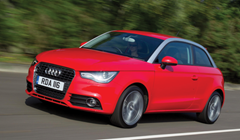Time to downsize?
 Derek Black considers whether tougher economic times will see motorists consider smaller models.
Derek Black considers whether tougher economic times will see motorists consider smaller models.
You could exist quite happily with a much smaller car than the one you currently own. Discuss.
Will the recession make more of us bite the bullet and downsize our cars?
There are lots of sensible arguments why we should. Economy and environmental concerns head the list. As we live in a small area where 100 miles is a long journey and have many narrow country roads, running a large car is becoming an expensive indulgence.
On the other hand, there are many sane and not particularly rich people who simply don’t like small cars. They are prepared to defy the tax regime for the comfort of a lot of metal around them. A basic small tin box would not feel right.
Now you can have it both ways.
Thanks to a new generation of premium small cars, the sacrifices of downsizing have been, well, downsized. These little limousines offer many of the comforts once reserved for the gas guzzlers. They score highly on the safety front with all the latest technology. Packed with style, they are far from the anonymous runabout.
A couple of small cars that I have driven recently illustrate the point very well. They are the Audi A1 and the Citroën DS3. At first glance these seem unlikely
bedfellows but I could live happily with either car on my daily tread.
I certainly did not feel deprived or hair- shirted when I was driving the Audi A1. Unlike the quirky A2, their last attempt at a small car, the A1 is a miniature of the mainstream Audis. It has the looks, the quality feel and the equipment of its bigger brothers.
I have been driving the very frugal 1.6 turbo diesel version which is quick enough for most with 0-62 mph in 10.5 seconds. You can also get interesting 1.2 or 1.4-litre turbo petrol engines. But the diesel posts a sensational 70 mpg on the combined cycle and emissions of just 105 g/km. Most drivers won’t achieve this set piece figure but I was satisfied to achieve 55 mpg.
The A1 sits confidently on the road with advanced electronics such as stability control as standard. All engines have stop- start to save fuel in traffic and braking energy is recaptured to improve efficiency. The only real downside is that rear seat room is limited and there is no five-door variant.
The diesel versions are priced from £15,675.
Can the DS3, the first of a new line of bespoke Citroëns, live with such posh company. Certainly, the 150 bhp 1.6-litre petrol Sport that I drove was well up there on interior quality and on road performance.
It shapes up well against the so-called hot hatches with 0-62 mph in 7.4 seconds and has very impressive handling and road holding. Priced at just under £16,000, the DS Sport is a driver’s delight as well as having a premium feel.
No two DS3s need ever be the same, thanks to the myriad combinations available. You can specify exterior and interior colours, materials, finishes, trims and equipment.
Awarded a five-star Euro NCAP rating for occupant protection, DS3 is both safe and secure. High levels of standard safety equipment include ESP, ABS with EBD and EBA, six airbags, a reinforced body structure and two IsoFix child seat mounts.
An environmentally-considerate DStyle 99g version – equipped with a new version of the HDi 90 hp diesel engine – is also available and, as its name suggests, this models emits just 99 g/km and can match the Audi on the combined cycle with a theoretical 70mpg.





